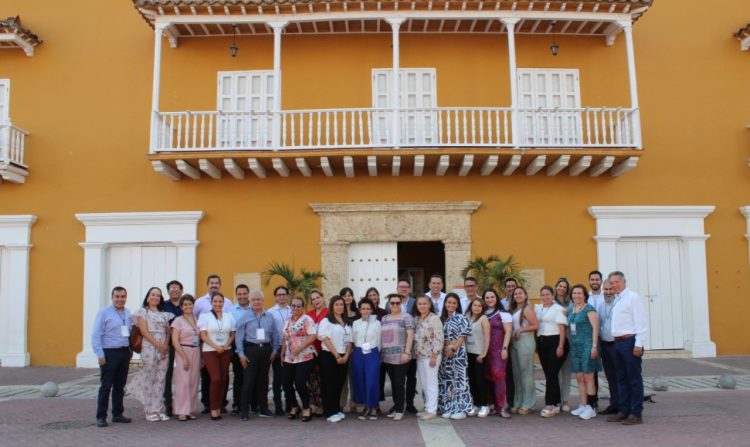Experts from Colombia, Mexico, Chile, Peru met the team from the Social Policies area of the EUROsociAL+ Programme at the School of Hospitality and Gastronomy, Casa del Marqués in Cartagena (Colombia) to build a roadmap to make labour skills certifications valid in the four PA member countries.

Photo: EUROsociAL+
On 16, 17 and 18 March, the city of Cartagena, Colombia, hosted the 2nd meeting of the Technical Labour Group and the network of experts in certification of labour skills of the Pacific Alliance (PA) with the team from the Social Policies area of the European Union EUROsociAL+ programme. Coordinated by the IILA , this area has been assisting the network with this task in terms of job skills and a standardised model, for three years. The document was drafted based on a previous presidential mandate (Lima Declaration, 6 July 2019) that established the need to “draft a comparative report on the evaluation and certification of labour skill systems in Pacific Alliance countries, as a first step towards the creation of a roadmap to standardise qualification systems”.
The study was completed successfully and is now a source of reference in the region in terms of work skills certification, clearly establishing the legitimacy, equivalence and validity of the four certification systems of labour skills in AP countries, and also laid the foundations – combined with a catalogue of endorsed profiles that were worked on in parallel – for a work skill certification approval and mutual recognition system in all four countries.
Based on previous progress in December 2020, under the subsequent term of presidential office, work began to create an operating system for the approval and recognition of qualifications, which was also successful and was presented at the 2nd meeting in Cartagena. The AP now has a system for the recognising and standardising job skills, drawn up by consensus and which provides legal certainty due to the steps followed and its joint production. To ease its coming into force, both the implementation model and the pilot to test it were prepared and approved at the Cartagena meeting.
In this regard, the implementation model defines the roadmap with operational recommendations on the legal and functional adaptations that each country must undertake. It also includes a pilot action that will apply to 200 people cases in the care, hospitality, construction and trade industries with different professional profiles. The pilot action will run throughout this year to identify improvements for inclusion in the implementation process. This model will be fully operational by 2023 and will improve mobility for people in the region.
Among the authorities and officials at the opening session of the 2nd meeting were the vice minister of Employment and Pensions of the Colombian Ministry of Labour , Andrés Uribe Medina; the focal point of the ES+ programme of the Delegation of the European Union in Colombia, Manuel Fernández Quilez and the director of the host organisation, the National Training Service SENA, William Orozco Daza. Gloria Arredondo, a senior technician of the EUROsociAL+ Programme, took part at the end of the event, emphasising the strategic importance of this regional model and the work done by the network.
The DUE representative in the country made some interesting remarks, referring to the fact that “having a system for recognition and approval of qualifications from any country in another, encourages: i) effective regional mobility of workers, a factor that improves economic development, ii) increased validity of these systems in each country to the extent that they are also highly valued in other countries and, iii) better management of human resources in companies by increasing opportunities to find qualified personnel and broadening workers’ horizons to find quality jobs”.
This is also an unprecedented model in the world because it is the first system of the kind that we know of. It is the first in Latin America and in Europe, and we do not yet have anything similar. Thus far, approvals have been used for formal education systems, but not for vocational training and job skills recognition systems. The achievements of the PA, with the support of the EUROsociAL program, change this reality and raise the strategic importance of vocational training and job skills in the region, arousing great interest in this initiative in different countries. In fact, the EUROsociAL+ programme has been invited by the European Centre for the Development of Vocational Training (CEDEFOP) to present the experience at the 4th Validation Prior Learning (VPL) Biennale in Iceland in May 2022.



